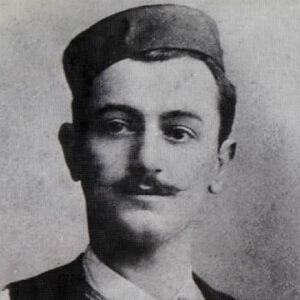Aleksa anti was a Bosnian Serb poet whose most well-known works spanned the nineteenth and twentieth centuries. He resided in the multi-cultural Balkans and based his work on emotional truth sensitivity and historical awareness, which was facilitated by his location in a historically turbulent region. Over 800 poems and six collections were published during his lifetime as a poet. He was named editor-in-chief of ‘Zora,’ (Dawn), a publication that chronicles current Bosnian cultural events. He expanded on Muslim themes, like gardens and love longing, as he progressed in his creative endeavors by creating songs in addition to poems and plays. His political awareness led him to offer his services to the Serbian government during the early twentieth-century crisis when Austria-Hungary legally acquired Bosnia-Herzegovina, and he did so again when the Balkan War broke out a few years later. During World War I, he was kidnapped by the Austro-Hungarian forces occupying Bosnia because of his patriotic stance and writings. He suffered from poor health for the majority of his adult life, but he persisted to write for his country until his death. Continue reading to learn more about his work and life.
Childhood and Adolescence
He was born on May 27, 1868, in the Ottoman Empire’s Mostar, in what is now Bosnia and Herzegovina, or Bosnia. His father, Risto, was a businessman, while his mother, Mara, was a housewife. He had three brothers and sisters: Jeftan, Jakov, and Radojka, plus a sister Zorica who died in infancy.
By 1878, Austria-Hungary had occupied Bosnia and Herzegovina, and it was controlled as part of their realm. His father died around this time, and his uncle was given care of Aleksa and his siblings.
Anti attended commercial schools in Ljubljana and Trieste since his natal family showed little interest in his lyrical aptitude. He returned to Mostar with a broader perspective thanks to his travels, and he was resolved to pursue his literary career rather than pursue a business job.
Career of Aleksa Šantić
His first poem was published in 1886. His love poetry explored Muslim themes in new ways, with settings ranging from gardens to fountains to secret trysts with virtually unattainable women.
In 1888, he formed and presided over the Bosnian music association ‘Gusle.’ He wrote songs in the style of traditional Bosnian love songs known as ‘sevdalinkas,’ combining musical and literary efforts into a powerful nationalistic force.
As his homeland was occupied, he became a symbol of preserving Bosnian heritage for other patriots. His patriotic poetry, such as 1896’s ‘Stay Here,’ depict the longing of individuals who have wandered away from their homeland and seek to return.
He translated Heinrich Heine from German to Serbo-Croatian from 1897 to 1898. Anti was inspired by Heine’s sardonic wit and irony, and he cited him as an influence, along with Serbian poet Vojislav Ilic, whose poetry dealt with merciless nature and man’s moral degeneration.
Perhaps his most well-known poem is ‘Emina,’ written in 1903. It evolved into the’sevdalinka’ form, which depicts a lover gazing longingly at his beloved from afar, desiring to express his love but knowing it is unrequited, one of life’s many failures.
In 1907, he tried a new style of creative production with ‘Into The Fog,’ a poetry dramatization. He also wrote some prose and six other plays.
During the Balkan Wars of 1912-1913, he was compelled to write passionately about his love for his motherland. The book ‘Na starim ognjistima’ (On the Old Hearths) was written in 1913 as a result of this inspiration.
He was kidnapped by Austrian forces occupying his country during World War I. Because of his strongly patriotic songs and poems, he was accused of treachery.
He translated the works of Svatopluk Cech, a Czech poet, into Serbo-Croatian in 1919. He developed a strong interest in Czech literature and language, particularly that of Cech, who championed Slavic unity principles that became anti’s goal.
Major Projects of Aleksa Šantić
Emina Koluder, his young Muslim neighbor, inspired him to write the passionate poetry “Emina.” The poem, which was adapted to music as a sevdalinka, has been popular for over a century and has a number of YouTube covers. Seven collections of poems by the distinguished poet were released between 1891 and 1913.
Achievements & Awards
He was a corresponding member of the distinguished ‘Serbian Royal Academy,’ formed in 1841, as of 1914. The Serbian Academy of Sciences and Arts is now known as the ‘Serbian Academy of Sciences and Arts.’
Personal History and Legacy
His health deteriorated throughout his life, and he died from tuberculosis on February 2, 1924. Members of various faiths attended the funeral of this patriotic poet.
A Bosnian hamlet named Aleksa anti is named for the poet. It was renamed Fernbach during the Hungarian Axis occupation of World War II, but it reverted to its former name after the war.
On ten Bosnia and Herzegovina convertible marks bills, he is shown. The term’mark’ refers to the German mark, which is equivalent to the value of convertible marks bills.
Emina Koluder, the subject of this great poet’s work “Emina,” married fourteen times and had fourteen children. She was born in 1884 and died in 1967.
Radojka, also known as Persa, was the sister of this great poet and married his friend Svetozar Corovic. Corovic was another a patriotic writer who died in 1919 after being tortured and contracting disease in a Hungarian internment camp.
Estimated net worth
The estimated net worth of Aleksa Šantić is unknown.


